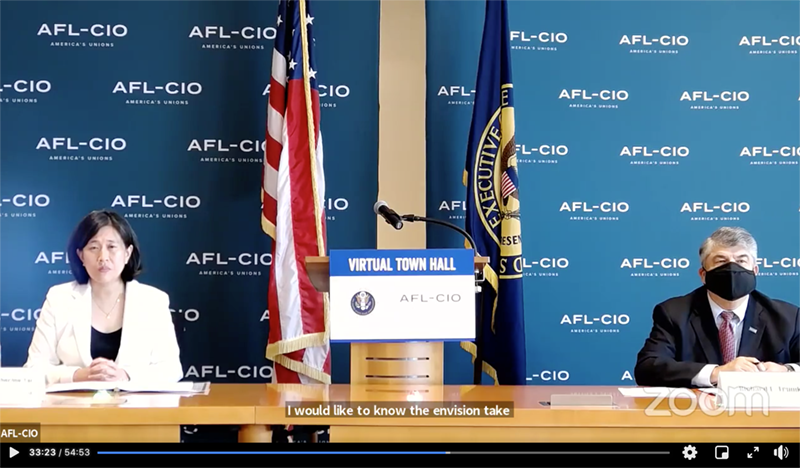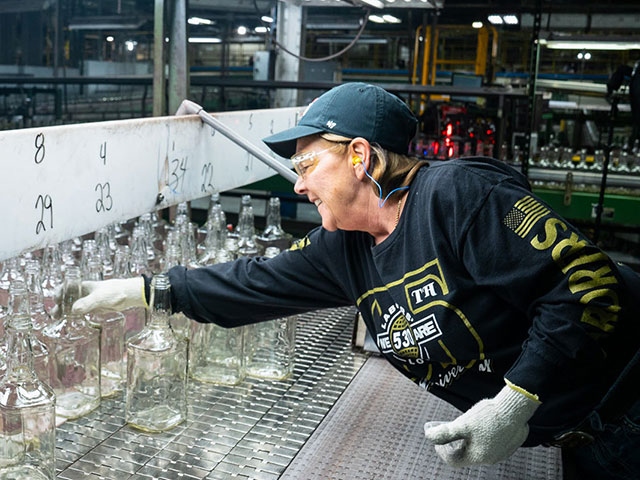New USTR Pushes Worker-Centered Trade Policy
American workers must be at the center of U.S. trade policy-making so that those decisions ensure that they share in the nation’s economic prosperity, U.S. Trade Representative Katherine Tai told union members at a June 10 AFL-CIO virtual town hall meeting.
“We want to make trade a force for good that encourages a race to the top,” Ambassador Tai said as she laid out what she called a worker-centered vision for the Biden administration’s trade policy.
“The first step to achieving this goal is creating a more inclusive process,” Tai said. “In order to understand how trade affects workers, we want to come meet with, listen to, and learn from them.”
That approach has already achieved results, AFL-CIO President Richard Trumka said as he introduced Tai. Prior to her appointment as USTR, Tai served as chief trade counsel for the U.S. House Ways and Means Committee, playing a key role in fighting for strong worker protections in the U.S.-Mexico-Canada Trade Agreement (USMCA).
“She was on our side in the trenches every single moment of that fight,” Trumka said.
While the USMCA is not perfect, Tai said, it is a far better deal than its failed predecessor, NAFTA, because it included significant input from working people. That process can serve as a template for the Biden administration to follow as it pursues future trade policies that put people first, she said.
“By bringing workers from all backgrounds and experiences to the table, we will create inclusive trade policy that advances economic security and racial and gender equity,” Tai said. “We want to lift up women, communities of color, and rural America – people that have been systematically excluded or overlooked.”
The focus on lifting up workers rather than on maximizing profits will ensure that the United States doesn’t continue its failed policies of the past, Trumka said.
Those policies resulted in cheap foreign products dumped in the United States, illegal subsidies that unfairly undercut U.S. producers, currency manipulation, offshoring of jobs and other practices that harmed U.S. manufacturing workers and destroyed communities, he said.
“There are consequences of failed trade policies, and we can’t repeat the mistakes of our past,” Trumka said. “Today marks the start of a new era. Ambassador Tai values workers’ voices and truly believes in workers’ rights.”
Following Tai’s opening remarks, she took questions from several rank-and-file union members, the first of which came from Kameen Thompson, president of USW Local 9462 at the Cleveland-Cliffs steel mill in Conshohocken, Pa.
Thompson questioned Tai on how the administration would make sure American workers – and Steelworkers in particular – benefit from the promise of the expanding renewable energy industry.
Tai said the Biden administration would continue to work with labor leaders and global allies to address overcapacity in the steel industry and craft policies at home that promote strict Buy American provisions.
“The steel industry is critical to our economy and our national security. It’s also a crucial component in solar and in wind,” she said. “We will be better able to respond to overcapacity if we consult closely with the United Steelworkers and partner with our allies.”
In addition, Tai said, the administration must continue to pursue other policies to lift up struggling Americans, such as the Protecting the Right to Organize (PRO) Act, tax reform that eases the burden on working people, and a platform to advance racial and gender equity.
The people-first vision that Tai laid out on behalf of the Biden administration is one that “workers have yearned for years to hear,” Trumka said.
Tai, who took office as the U.S. Trade Representative in March following unanimous confirmation in the U.S. Senate, said that she looks forward to continuing her outreach to workers as she works to reform U.S. trade policy.
“It is still the early days, and we have far more to do,” she said. “By working together, we will achieve a trade policy that prioritizes the dignity of work and workers, that promotes shared prosperity and racially inclusive, equitable economic growth here at home and abroad.”
Click here to watch the full virtual town hall.
By clicking Sign Up you're confirming that you agree with our Terms and Conditions.
Recent News Articles
Want to Learn More?
See how the USW is making a real difference in our communities and our workplaces.



